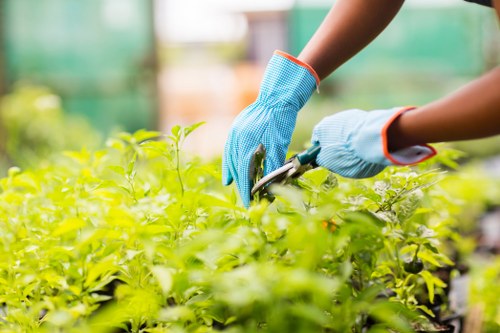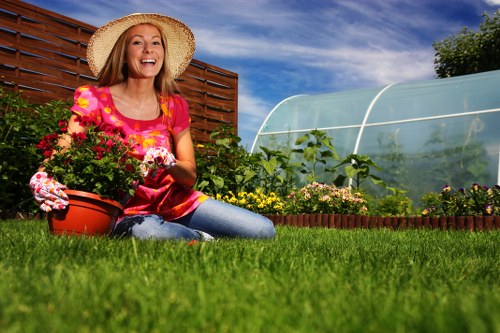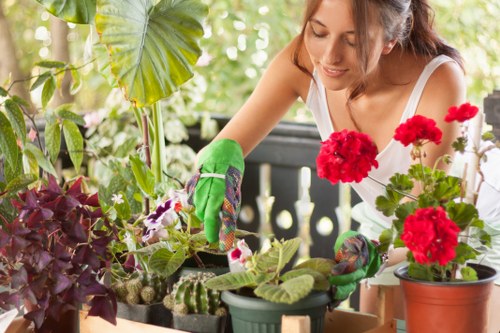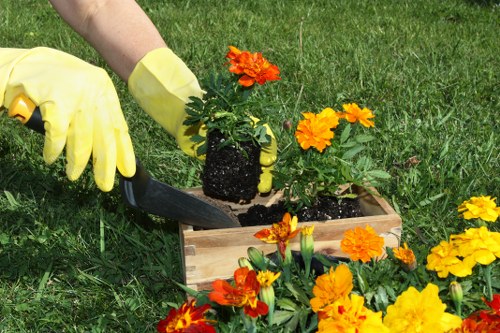Garden Maintenance in Garden Landscapes
Understanding the Importance of Garden Maintenance

Maintaining a beautiful garden landscape requires consistent effort and attention to detail. **Garden maintenance** not only enhances the aesthetic appeal of your outdoor space but also promotes the health and longevity of your plants.
Regular upkeep helps in identifying and addressing issues such as pests, diseases, and weed infestations early on. By implementing a structured maintenance routine, you can ensure that your garden remains vibrant and thriving throughout the year.
Moreover, a well-maintained garden can significantly increase the value of your property, providing a serene and inviting environment for relaxation and entertainment.
Essential Garden Maintenance Tasks

Effective garden maintenance involves a variety of tasks that cater to the diverse needs of different plant species. Some of the essential tasks include:
- Pruning: Regular pruning helps in shaping plants, removing dead or diseased branches, and promoting healthy growth.
- Lawn Care: Mowing, aerating, and fertilizing the lawn ensures a lush and green appearance.
- Weed Control: Eliminating weeds prevents them from competing with your plants for nutrients and water.
- Watering: Adequate watering is crucial, especially during dry periods, to keep plants hydrated and thriving.
- Soil Management: Testing and amending the soil ensures that it has the right pH and nutrient levels for optimal plant growth.
Implementing these tasks regularly can make a significant difference in the overall health and beauty of your garden.
Seasonal Maintenance Tips

Different seasons bring unique challenges and opportunities for garden maintenance. Adapting your maintenance routine to the changing seasons can help in keeping your garden in top shape:
- Spring: Focus on planting new flowers, mulching, and preparing the soil for the growing season.
- Summer: Ensure consistent watering, control pests, and prune overgrown plants.
- Autumn: Rake fallen leaves, plant bulbs for spring, and protect plants from early frosts.
- Winter: Trim trees, clean garden tools, and plan for next year's garden layout.
By tailoring your maintenance activities to each season, you can address specific needs and enhance your garden's resilience against seasonal changes.
Choosing the Right Tools for Garden Maintenance

Having the right tools is essential for efficient garden maintenance. Investing in quality tools can make tasks easier and more enjoyable:
- Pruning Shears: For precise cutting and shaping of plants.
- Lawn Mower: To keep your grass at an optimal height.
- Garden Fork: For aerating the soil and removing weeds.
- Watering Can or Hose: To ensure plants receive adequate hydration.
- Wheelbarrow: For transporting soil, plants, and other materials.
Maintaining your tools properly by cleaning and storing them correctly will prolong their lifespan and ensure they function effectively when needed.
Organic vs. Chemical Maintenance Practices

When it comes to garden maintenance, **sustainable practices** are increasingly preferred. Choosing between organic and chemical methods can impact the health of your garden and the environment:
- Organic Methods: Utilize natural fertilizers, compost, and biological pest control to maintain garden health without harmful side effects.
- Chemical Methods: Employ synthetic fertilizers and pesticides for rapid results but with potential risks to beneficial insects and soil health.
Integrating organic practices promotes a more eco-friendly garden, supporting biodiversity and reducing pollution. However, in some cases, chemical interventions may be necessary to manage severe infestations or nutrient deficiencies.
Landscape Design and Maintenance Integration
Effective garden maintenance goes hand-in-hand with thoughtful landscape design. By integrating maintenance considerations into your design, you can create a space that is both beautiful and manageable:
- Plant Selection: Choose plants that are well-suited to your climate and soil conditions to minimize maintenance needs.
- Layout Planning: Design pathways and garden beds that allow easy access for maintenance tasks.
- Irrigation Systems: Install automated watering systems to ensure consistent hydration with minimal effort.
- Mulching: Use mulch to retain soil moisture, suppress weeds, and regulate soil temperature.
By considering maintenance during the design phase, you can create a harmonious and sustainable garden landscape that requires less time and resources to upkeep.
Common Challenges in Garden Maintenance
Maintaining a garden is not without its challenges. Some common issues gardeners face include:
- Pest Infestations: Insects and other pests can damage plants and disrupt the ecosystem.
- Disease Outbreaks: Fungal and bacterial diseases can spread quickly if not managed promptly.
- Weed Proliferation: Weeds compete with desirable plants for resources, affecting their growth.
- Water Management: Overwatering or underwatering can lead to plant stress and mortality.
- Soil Degradation: Compacted or nutrient-poor soil can hinder plant development.
Addressing these challenges requires vigilance, knowledge, and proactive strategies to maintain a healthy and vibrant garden.
Advanced Garden Maintenance Techniques
For seasoned gardeners looking to elevate their maintenance practices, several advanced techniques can be employed:
- Companion Planting: Planting compatible species together to enhance growth and deter pests.
- Hydroponics: Growing plants without soil, using nutrient-rich water solutions for faster growth.
- Permaculture: Creating a sustainable and self-sufficient garden ecosystem.
- Mulch Gardening: Using various types of mulch to improve soil health and reduce maintenance.
- Integrated Pest Management (IPM): Combining biological, cultural, and chemical methods for effective pest control.
Incorporating these techniques can lead to a more resilient and efficient garden, reducing the need for intensive maintenance while promoting sustainability.
Benefits of Regular Garden Maintenance
Engaging in regular garden maintenance offers numerous benefits, including:
- Enhanced Aesthetics: A well-maintained garden is visually appealing and provides a pleasant environment.
- Improved Plant Health: Regular care ensures plants are free from pests and diseases, promoting robust growth.
- Increased Property Value: A beautiful garden can boost the market value of your home.
- Stress Reduction: Gardening activities can be therapeutic, reducing stress and enhancing mental well-being.
- Environmental Benefits: Healthy gardens support local wildlife and contribute to a balanced ecosystem.
By committing to ongoing maintenance, gardeners can enjoy these advantages and foster a thriving outdoor space.
Hiring Professional Garden Maintenance Services
While DIY maintenance is feasible, hiring professional garden maintenance services can offer additional benefits:
- Expertise: Professionals have the knowledge and experience to manage complex gardening tasks effectively.
- Time-Saving: Outsourcing maintenance frees up time for homeowners to enjoy their gardens without the associated labor.
- Customized Care: Services can be tailored to meet the specific needs of your garden, ensuring optimal results.
- Access to Quality Tools: Professionals use specialized equipment that may not be readily available to the average gardener.
- Consistent Maintenance: Regularly scheduled services ensure that maintenance tasks are performed consistently and thoroughly.
Investing in professional maintenance can lead to a more polished and healthy garden with less effort on your part.
Eco-Friendly Garden Maintenance Practices
Adopting eco-friendly maintenance practices contributes to a sustainable and environmentally responsible garden:
- Composting: Recycling organic waste into compost enriches the soil naturally.
- Rainwater Harvesting: Collecting rainwater reduces dependence on municipal water sources and conserves water.
- Natural Fertilizers: Using compost, manure, and other natural fertilizers avoids the harmful effects of synthetic chemicals.
- Biological Pest Control: Introducing beneficial insects helps manage pest populations without chemicals.
- Solar Lighting: Utilizing solar-powered lights minimizes energy consumption and reduces carbon footprint.
Implementing these practices not only benefits the environment but also enhances the long-term sustainability of your garden.
Innovative Technologies in Garden Maintenance
Modern technology has revolutionized garden maintenance, making it more efficient and effective:
- Smart Irrigation Systems: Automated watering systems adjust based on weather conditions and soil moisture levels.
- Garden Management Software: Tools that help plan, track, and manage gardening activities seamlessly.
- Drones: Used for monitoring large gardens, identifying pest issues, and assessing plant health.
- Robotic Lawn Mowers: Autonomous mowers that maintain the lawn without manual intervention.
- IoT Devices: Sensors that provide real-time data on soil conditions, plant health, and environmental factors.
Incorporating these technologies can streamline maintenance tasks, enhance precision, and improve overall garden health.
Creating a Maintenance Schedule
Establishing a maintenance schedule ensures that all necessary tasks are performed regularly and systematically:
- Daily: Check for signs of pests or disease, water plants as needed.
- Weekly: Mow the lawn, weed garden beds, and prune overgrown plants.
- Monthly: Fertilize the soil, test soil pH, and inspect garden structures.
- Seasonally: Perform deep soil amendments, plant seasonal flowers, and prepare the garden for upcoming weather changes.
- Annually: Review and update the garden plan, invest in new plants or structures, and conduct a comprehensive garden clean-up.
A well-structured maintenance schedule helps in organizing tasks, preventing neglect, and maintaining a healthy and attractive garden.
Gardening Tips for Beginners
Starting a garden can be overwhelming for beginners, but with the right approach, it can be a rewarding experience:
- Start Small: Begin with a manageable garden size to develop your skills and confidence.
- Choose the Right Plants: Select plants that are well-suited to your climate, soil, and sunlight conditions.
- Learn Basic Techniques: Understand fundamental gardening practices such as planting, watering, and pruning.
- Invest in Quality Tools: Having the right tools makes maintenance tasks easier and more efficient.
- Seek Guidance: Utilize resources such as gardening books, online forums, and local gardening clubs for support and advice.
By following these tips, beginners can establish a successful garden and enjoy the process of nurturing plant growth.
Maintaining Garden Structures
Garden structures like fences, pergolas, and arbors add character and functionality to your landscape. Proper maintenance of these elements is crucial:
- Regular Cleaning: Remove dirt, debris, and mold to prevent deterioration.
- Painting and Sealing: Protect wooden structures from weather damage by applying appropriate coatings.
- Inspection: Check for signs of wear, rot, or damage and repair as necessary.
- Pruning Vines: Control the growth of climbing plants to prevent overgrowth and maintain structural integrity.
- Lawn Equipment Storage: Keep tools and equipment organized and maintained to extend their lifespan.
Maintaining garden structures enhances their appearance and ensures they remain functional and safe for use.
Soil Health and Its Role in Garden Maintenance
Healthy soil is the foundation of a thriving garden. Maintaining soil health involves:
- Soil Testing: Regularly test soil pH and nutrient levels to determine appropriate amendments.
- Organic Matter: Incorporate compost and other organic materials to improve soil structure and fertility.
- Mulching: Apply mulch to retain moisture, suppress weeds, and regulate soil temperature.
- Crop Rotation: Rotate plant families to prevent nutrient depletion and reduce pest buildup.
- Aeration: Loosen compacted soil to enhance root growth and water penetration.
By prioritizing soil health, gardeners can ensure that their plants receive the necessary nutrients and conditions for optimal growth.
Water Management Strategies
Effective water management is essential for sustainable garden maintenance:
- Drip Irrigation: Delivers water directly to the plant roots, reducing evaporation and water waste.
- Rain Gardens: Utilize natural landscaping to collect and manage rainwater runoff.
- Water Conservation: Implement practices such as mulching and using drought-resistant plants to minimize water usage.
- Smart Controllers: Use technology to optimize irrigation schedules based on weather forecasts and soil moisture levels.
- Greywater Systems: Recycle household wastewater for garden irrigation, promoting resource efficiency.
Adopting these strategies helps in conserving water, promoting sustainable gardening, and ensuring that plants receive adequate hydration.
Pest and Disease Management
Protecting your garden from pests and diseases involves proactive and integrated approaches:
- Regular Monitoring: Inspect plants frequently for signs of pests or disease to address issues promptly.
- Biological Controls: Introduce beneficial insects like ladybugs and predatory mites to naturally reduce pest populations.
- Cultural Practices: Implement crop rotation, proper spacing, and sanitation to minimize pest and disease risks.
- Organic Treatments: Use neem oil, insecticidal soaps, and other natural remedies to manage infestations.
- Resistant Varieties: Choose plant varieties that are naturally resistant to common pests and diseases.
Effective pest and disease management ensures the health of your garden plants and maintains the overall balance of the ecosystem.
Pruning and Trimming Techniques
Pruning and trimming are critical for maintaining plant health and aesthetics:
- Deadheading: Removing spent flowers encourages new blooms and prevents seed formation.
- Shape Pruning: Trimming plants to achieve a desired form and structure.
- Maintenance Pruning: Cutting back overgrown branches to improve air circulation and sunlight exposure.
- Thinning: Removing excess growth to reduce competition among branches and promote healthier development.
- Timing: Prune at appropriate times of the year to avoid stressing plants and to support optimal growth cycles.
Proper pruning techniques enhance plant vitality, encourage fruitful growth, and maintain the visual appeal of your garden.
Mulching Practices
Mulching is a versatile maintenance practice that offers multiple benefits:
- Moisture Retention: Helps keep the soil consistently moist by reducing evaporation.
- Weed Suppression: Inhibits the growth of unwanted plants, reducing the need for manual weeding.
- Temperature Regulation: Maintains stable soil temperatures, protecting roots from extreme heat or cold.
- Soil Improvement: Organic mulches decompose over time, adding nutrients and improving soil structure.
- Erosion Control: Prevents soil erosion by shielding the ground from heavy rain and wind.
Applying mulch strategically enhances garden health, reduces maintenance efforts, and contributes to a polished landscape appearance.
Fertilization Strategies
Fertilizing your garden provides essential nutrients that support plant growth and productivity:
- Soil Testing: Determine nutrient deficiencies through regular soil testing to apply appropriate fertilizers.
- Balanced Fertilizers: Use fertilizers with a balanced ratio of nitrogen, phosphorus, and potassium for overall plant health.
- Organic Fertilizers: Incorporate compost, bone meal, and other organic amendments to enhance soil fertility naturally.
- Slow-Release Fertilizers: Apply fertilizers that release nutrients gradually, ensuring a steady supply to plants.
- Proper Application: Follow recommended application rates and methods to prevent nutrient burn and environmental contamination.
Effective fertilization strategies promote robust plant growth, higher yields, and a healthy garden ecosystem.
Harvesting and Post-Harvest Care
For vegetable and fruit gardens, proper harvesting and post-harvest care are crucial components of maintenance:
- Timely Harvesting: Pick produce at the peak of ripeness to ensure the best flavor and nutritional value.
- Handling: Handle harvested items gently to prevent bruising and damage.
- Storage: Store produce in appropriate conditions to extend shelf life and maintain quality.
- Preservation: Utilize methods like freezing, canning, and drying to preserve excess harvest for future use.
- Cleanup: Remove plant debris after harvesting to reduce the risk of disease and pest infestation.
These practices not only maximize the benefits of your garden produce but also contribute to the overall maintenance and health of your garden.
Watering Techniques for Optimal Plant Health
Proper watering is fundamental to garden maintenance and plant health:
- Deep Watering: Encourage deep root growth by watering thoroughly rather than frequently shallow watering.
- Early Morning Watering: Watering in the early hours reduces evaporation and allows plants to absorb moisture before the heat of the day.
- Avoid Overwatering: Ensure proper drainage to prevent root rot and other water-related issues.
- Mulch: Apply mulch to reduce surface evaporation and maintain soil moisture levels.
- Watering Schedule: Establish a consistent watering routine based on plant needs and weather conditions.
Implementing effective watering techniques ensures that plants receive adequate hydration, promoting robust growth and resilience against stress.
Implementing Sustainable Garden Practices
Sustainability in garden maintenance promotes environmental responsibility and long-term garden health:
- Native Plants: Incorporate native species that are adapted to local conditions and require less maintenance.
- Organic Gardening: Avoid synthetic chemicals and focus on natural methods for plant care.
- Resource Conservation: Utilize water-efficient systems and recycled materials to minimize resource consumption.
- Biodiversity: Encourage a diverse range of plants and wildlife to create a balanced ecosystem.
- Energy Efficiency: Use renewable energy sources for garden lighting and other power needs.
By embracing sustainable practices, gardeners can reduce their environmental footprint and create a thriving, eco-friendly garden.
Winterizing Your Garden
Preparing your garden for winter is a crucial maintenance step to protect plants and structures from harsh conditions:
- Mulching: Apply a thick layer of mulch to insulate plant roots against freezing temperatures.
- Pruning: Trim back dead or vulnerable branches to prevent damage from snow and ice.
- Protecting Plants: Use frost covers or burlap to shield sensitive plants from extreme cold.
- Tool Maintenance: Clean and store garden tools properly to prevent rust and wear.
- Composting: Continue composting to maintain soil fertility for the upcoming growing season.
Winterizing ensures that your garden remains healthy and prepared for a successful spring revival.
Creating a Year-Round Maintenance Plan
Developing a year-round maintenance plan helps in organizing tasks and ensuring consistent garden care:
- Calendar Integration: Incorporate gardening tasks into your yearly calendar to stay on track.
- Task Prioritization: Identify high-priority tasks for each season to allocate resources effectively.
- Flexibility: Be prepared to adjust your plan based on weather changes and unforeseen challenges.
- Record Keeping: Maintain records of maintenance activities, plant performance, and garden observations.
- Continuous Learning: Stay informed about new gardening techniques and trends to enhance your maintenance practices.
A comprehensive maintenance plan facilitates smooth garden operations and contributes to sustained garden beauty and productivity.
Final Thoughts on Garden Maintenance
Effective garden maintenance is a blend of knowledge, effort, and passion. By embracing regular upkeep, utilizing the right tools and techniques, and adopting sustainable practices, you can cultivate a stunning and healthy garden landscape.
Whether you choose to maintain your garden yourself or enlist professional services, the key is consistency and attentiveness to your garden's unique needs.
**Contact us today** to learn more about our garden maintenance services and take the first step toward transforming your garden into a lush, vibrant oasis.